|
|
|
Sort Order |
|
|
|
Items / Page
|
|
|
|
|
|
|
| Srl | Item |
| 1 |
ID:
090568


|
|
|
|
|
| Publication |
2009.
|
| Summary/Abstract |
One of the key tools for achieving India's stated ambition of stopping national fragmentation in the Northeast is the Armed Forces (Special Powers) Act (1958) (AFSPA). This article assesses Indian Government efforts to manage the parts of the Indo-Burmese borderlands that are subject to this law. It compares the approaches of governments on the Burmese and Indian sides of the frontier and interrogates the financial incentives that complement security policies in their shared borderlands. Economic incentives for ceasefire and disarmament are, I argue, part of a portfolio of pacification and reintegration strategies that are premised on the controlled ambiguities of the borderlands. As such, I argue that the impunities allegedly at the heart of the AFSPA are matched by the freedom of the Indian Government to funnel resources into paying off its enemies. In the Indian case, the wider environment in which the AFSPA is implemented cannot be ignored if a full analysis of its 50 years of operation is to be offered. The implementation of surrender agreements in the ambiguous space of the Indo-Burmese borderlands exemplifies how the Indian Government has prioritised national cohesion above legal, political or economic consistency.
|
|
|
|
|
|
|
|
|
|
|
|
|
|
|
|
| 2 |
ID:
133126
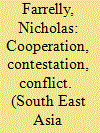

|
|
|
|
|
| Publication |
2014.
|
| Summary/Abstract |
In the period of social and political transformation that followed the election of President Thein Sein, ethnic politics remained a major preoccupation for the Myanmar government, ethnic peoples and the international community. Explaining the varieties of ethnic political interests that are emerging requires a new analytical framework in which the nascent electoral system is given adequate attention. This article argues that cooperation and contestation are now vying with conflict as primary drivers of ethnic politics. To account adequately for the interaction of these concepts, the article introduces various pieces of evidence concerning the different manifestations of ethnic political interests today. It describes an ambiguous situation in which the overall pattern of ethnic politics is changing rapidly. The challenge remains of fully reconciling Myanmar's diverse peoples and including them in one political system.
|
|
|
|
|
|
|
|
|
|
|
|
|
|
|
|
| 3 |
ID:
121662
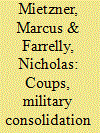

|
|
|
| 4 |
ID:
121666


|
|
|
|
|
| Publication |
2013.
|
| Summary/Abstract |
After five decades in which military dominance defined post-colonial politics, Burma has recently embarked on a long-delayed process of political reform. The gradual democratisation of the country's political institutions has meant that the history of its two twentieth-century coups is increasingly overlooked. This article presents a focused study of military interventionism in Burma and offers explanations for the successful entrenchment of military rule. The mindset of the military leadership and its success at sidelining opponents is explored alongside a preliminary consideration of the role that international support has played. Crucially, military leaders have been exasperated by what they consider feeble (and foreign-controlled) civilian authorities that have been incapable of preventing national fragmentation. This mindset, plus effective repression and support by neighbouring countries such as China, formed the basis of the military's rule. Therefore, the prospects of future democratisation efforts will rely on a fuller understanding of the processes that led the armed forces to exert consistent dominance.
|
|
|
|
|
|
|
|
|
|
|
|
|
|
|
|
| 5 |
ID:
121668
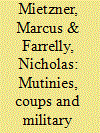

|
|
|
|
|
| Publication |
2013.
|
| Summary/Abstract |
Scholars of civil-military relations have long been puzzled by the fact that despite a series of mutinies, Papua New Guinea (PNG) has never seen a full-blown military takeover. Indeed, when PNG became independent in the early 1970s, some veteran PNG watchers had predicted that the country was likely to follow in the footsteps of many coup-prone African countries. In this article, the authors highlight the reasons for the surprising absence of coups in PNG by comparing the country to three South-East Asian nations that have experienced coups. By contrasting PNG with Indonesia, Burma and Thailand, the authors identify five key factors that have prevented coups in the former and facilitated them in the latter: first, the role that the military played in the struggle for independence or modern statehood; second, the size of the armed forces; third, the military's organisational capacity; fourth, geographical conditions and the military's command structure; and finally, the general relationship between civilian and military elites.
|
|
|
|
|
|
|
|
|
|
|
|
|
|
|
|
| 6 |
ID:
084447


|
|
|
|
|
| Publication |
2008.
|
| Summary/Abstract |
Discussions of resource management and development in northern Thailand often emphasize the threat of eviction faced by uplanders living in forest reserve zones. This "specter of eviction" is to be found in official government policy, in academic accounts of highland development, and in the activist writings of nongovernmental organizations (NGOs). The review of the literature in this article suggests, however, that very few evictions have in fact taken place since the early 1980s and the threat of eviction in accounts written over the past two decades is exaggerated. The authors examine some of the political, practical, and policy reasons why the rate of eviction has been very low. They conclude by arguing that reliance on the specter of eviction by activist academics and NGOs seeking to defend the rights of upland farmers results in a political strategy that is disempowering and disengaged from current livelihood realities.
|
|
|
|
|
|
|
|
|
|
|
|
|
|
|
|
| 7 |
ID:
148980
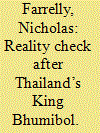

|
|
|
|
|
| Summary/Abstract |
Thailand faces immense challenges as it adjusts to the end of King Bhumibol Adulyadej’s 70-year reign. Its support for the geopolitical agendas of the Western democracies can no longer be taken for granted. For now, Nicholas Farrelly argues, Thailand’s military leadership is preparing for further turbulence and conflict.
|
|
|
|
|
|
|
|
|
|
|
|
|
|
|
|
| 8 |
ID:
175651


|
|
|
|
|
| Summary/Abstract |
There is no obvious end to the ongoing tragedy that faces the Muslim Rohingya communities of western Myanmar. Yet, with two important international legal cases underway at the International Court of Justice and the International Criminal Court there are now important opportunities to maintain pressure on Myanmar’s government. Myanmar’s current government – a fusion of militarist, democratic, ethno-nationalist and conservative interests – has consistently sought to downplay the seriousness of the situation. This attitude, and the fraught, but politically effective, nexus between Aung San Suu Kyi’s National League for Democracy (NLD) and the military, has done much to encourage a culture of impunity among military and civilian decision-makers. Nevertheless, with crucial national elections scheduled for November 2020, and an economy battered by the global COVID-19 shutdown, Myanmar faces a confluence of grave challenges. Under these conditions, key decision-makers in Naypyitaw may hope that international scrutiny of violence against the Rohingya will fade. Given these court actions, however, this is unlikely. Whatever sympathy we may have for Aung San Suu Kyi’s predicament, she will not recover her reputation. And she will forever face hard questions about her inability to prevent, and, more importantly, refusal to condemn, ethnic cleansing.
|
|
|
|
|
|
|
|
|
|
|
|
|
|
|
|
| 9 |
ID:
121664
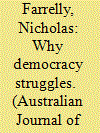

|
|
|
|
|
| Publication |
2013.
|
| Summary/Abstract |
Since the revolution of 1932 that ended absolute monarchy, Thailand has experienced sporadic military interventions, with 19 coups and coup attempts over those decades. This article explains these military interventions by emphasising the cultural aspects of Thai coup-making at the elite level. Concretely, the article shows that episodic military interventionism-supported by significant and persistent military influence in politics-is now part of a distinctive elite coup culture. In contrast to other so-called 'coup-prone' states, Thailand has largely accommodated military interventionism, especially by accepting the defence of the monarchy as a justification for toppling elected governments. Thailand's reluctance to redemocratise, and the haphazardness of the resulting institutional configurations, suggests that Thailand's elite-and, to some extent, the public as well-have deeply internalised the ultimate acceptability of coups. The test of this arrangement may come with the end of King Bhumibol Adulyadej's reign and the potential realignment of military influence in Thai society.
|
|
|
|
|
|
|
|
|
|
|
|
|
|
|
|
|
|
|
|
|